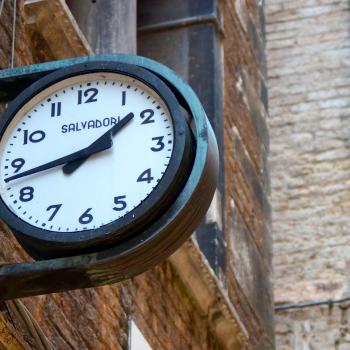
Time melts as it’s made, said Anthony Burgess. Each moment is both increase and surcease, the tip of the fountain, bubbling, collapsing—itself upon itself—at once always there and then never there at all. Like ice in a country made of steam, it lives and dies in the rift.
Wrapped within our youth, we do not see this, or if we do, it is of no consequence. We purchase the perjury of our stature and trust the deceit of our mass. We weigh ourselves, take our measure, and assume our heft and reach too great for a world so flat. In our young fancies, we are the stuff of marble, and cannot feel time’s rain wear upon us, both outside and in.
We would not care about time at all but for what it does. And what it does is always a shock. For in spite of what we believe of ourselves, one inauspicious morning, or one historic dusk, without notice, the cold, flat mirror resolves to house a stranger—an unwanted guest that will not leave, that lingers like a bad taste, intruding in pools of water, in store-front reflections, and in the sheen of another’s eye.
It grows only bolder as the years fall away, until at some point what stares back is a joke too scandalous for the telling. Our eyes refuse it, renounce the reflected whole for only the part that requires our ministry: the thinning hair, the yellowed teeth, the unshaven jaw, and pocked flesh. No longer do we stand back from the glass, admire and appraise. A portion of what we were becomes more than enough.
Thus, time is the negative reality with which we are most familiar—negative in that we know it, and believe in it, though we cannot experience it through our senses. Like famine, we can only witness its effects, the way it plows through the common world in silence, in pressureless invisibility. Its wake is even mightier than that of the universe, which graciously explodes in dazzling displays of light and fire, which courteously implodes in terrible holes of darkness and depth.
Conversely, time has no manners. It asks no permissions, rings no bells. And yet, it is the reason, the cause, of the exploding and the collapse. It signs its name in the spectacle of its spoil.
But no matter our youthful agnosticism, we are all converts to time in the end. Its negative apotheosis is too clear to leave anyone at peace in his doubts. It forces its creed upon us, drives us to our knees, and makes each of us into one of its rotting temples, its latest parish of waste.
It would seem, therefore, that we who have such sad and intimate familiarity with the negative reality of time could also appreciate the negative reality of evil. Its effects are no less great, and of far vaster devastation. Time’s is a neutral church. Though its flock is a forced gathering, it does not, need not, evangelize. It requires nothing of its adherents, save a Quaker-like stillness as it works its unholy way. Its only objective is to wear us down, body and spirit, until we lie in its graveyard of stones, between our paltry parentheses of dates.
But evil is a proselytizer. It shouts and storms its path through reality, bumping and thumping as it goes. There is no plane so cosmic that its blood cannot purple it, and no room so small that its calumny will not deface. Unlike time, evil’s is a creative, not a nullifying, force. Productive, efficient, it can make galaxies out of our meanest vices. Our treasons and savageries, ever so petty, are always beachheads—a Normandy upon whose landfall empires are built. Evil takes every form, speaks every tongue.
And yet, with all this to witness, with all the histories it has authored, it is hardly mentioned these days. The great irony, of course, is that we are its native congregants, its born disciples, but to confess or speak of it is to be rejected as primitive. To ascribe its label is to be set down as a self-appointed judge, a hypocrite, a simplifier, or all three. It seems no act is worthy of being called evil; an act is only a consequence—a retaliation—a response to some provocation, centuries old and multi-determined.
The papers bring news of an aged veteran beaten to death for his wallet, of an infant shot in the face, point-blank, and experts rush in to direct our attention to everything but the malevolent wills that said yes to such acts. Explanations become alibis, and “full” understandings of troubled pasts and broken homes, however tragic, imply that no individual choice is free.
I watch a talking head, with multiple degrees, explain that Good/Evil is a false dichotomy, the marked vocabulary of a dated orthodoxy: “It is much more complicated than that.” So even when innocence is murdered, slain before milk has wet its mouth, we’re taught that there are “conditions” to consider. Sophistication qualifies the palette and all fades to gray.
When reality is exchanged for relativity, conscience dies. Every circumstance calls for compromise, concession; things that once were not to be borne are now contexts that must be accommodated. There is nothing worth denouncing because there are no terms that call for denunciation. So there can be no convictions or conquests worth the candle; all are recused; none can say.
We are not “losing the language of evil,” as some idiot academic would have it. We are losing the gumption to call it such. And when nerve dies, the rest follows, until there is nothing left but a timeless hollow that once had the cheek to call itself a man.
Hamlet was wrong, it seems, but he would’ve had to live in our day to learn it. Conscience does not make cowards of us all; it is the death of conscience that does that.











